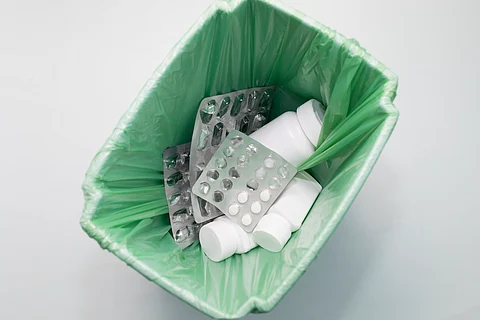

In May 2025, the Central Drugs Standard Control Organization circulated the guidelines on disposal of expired and unused drugs to all state and Union Territory drug controllers, urging them to encourage wider adoption by relevant stakeholders.
The guidelines broadly outline methods for the disposal of expired or unused drugs (for example, encapsulation, inertisation and incineration), existing policies, procedures to be followed by stakeholders and processes for the collection, storage and transportation of drugs prior to disposal. They also include a list of 17 drugs under a ‘Flush List’, which may be safely flushed down the sink or toilet to prevent harm.
The guidelines were developed following a 2018 study by the All India Institute of Medical Sciences, New Delhi, which highlighted the ecological risks posed by the disposal of expired or unused drugs in landfills.
Earlier in 2019, Delhi-based think tank Centre for Science and Environment (CSE) also drew attention to the improper disposal of such drugs in and around Delhi-National Capital Region, across household, retail and wholesale levels. It had also advocated for drug take-back initiatives to ensure that expired and unused medicines are returned from their point of generation to a facility for safe disposal.
CSE recommended introducing an extended producer responsibility (EPR) provision, making drug manufacturers, both branded and generic, accountable for the disposal of unused medicines.
EPR is a concept under which manufacturers are held responsible for the entire lifecycle of a product, including its take-back and disposal. Effective implementation would require consumer participation and involve reverse logistics to manage the return of products to manufacturers or designated facilities for recycling, reuse or disposal.
The current guidelines suggest that drugs should move back through the supply chain, meaning from retailer to supplier to manufacturer for disposal. For instance, a retailer should return expired stock to the supplier or manufacturer. A wholesaler, distributor or stockist should accept expired or unused drugs from those to whom they have been supplied, and ensure segregation and return.
Manufacturers, in turn, are to accept all expired or unused drugs from retailers and wholesalers. Procurement agencies, including government and private hospitals, may dispose of expired or unused medicines directly in accordance with the Biomedical Waste Management Rules, 2016 or return them to suppliers.
However, the responsibility is not fully placed on manufacturers. Moreover, consumers are not included in the reverse supply chain process, unlike drug take-back programmes in Europe and the United States, where consumer participation is central under EPR mandates. The guidelines, however, place strong emphasis on record-keeping and verification by regulatory authorities when required.
For public disposal of expired or unused drugs, state drug control departments and chemists’ and druggists’ associations are encouraged to jointly launch drug take-back sites or programmes at designated locations. Citizens can drop off unused or expired medicines from home, which will then be appropriately disposed of by the associations.
Kerala already has an operational drug take-back initiative, the New Programme on Removal of Unused Drugs or nPROUD, launched in December 2024 by the state drug control department. Piloted in the Kozhikode Municipal Corporation and the Ulliyeri panchayat, the programme covers nearly 200,000 households and thousands of medical stores.
Dedicated volunteers collect unused or expired medicines door to door at no cost. Blue-coloured bins are also planned to be placed at medical stores for drug collection. Commercial operators, including retailers, wholesalers and hospitals, are required to pay Rs 40 per kilogramme for disposal. All collected medicines are incinerated at a designated facility in Ernakulam.
Household waste is managed by the Municipal Corporation, which is responsible for the collection, segregation and disposal of domestic waste, including medicines. Under municipal solid waste management bye-laws, corporations are also required to collect unused drugs from retailers and wholesalers.
In light of this new development, coordination between drug regulators, pollution control boards and municipal corporations will be key to ensuring effective implementation.
“The guidelines are a good development, but we need to see how retailers and wholesalers implement them,” said AN Mohan, president of the All Kerala Chemists and Druggists Association. The All India Organisation of Chemists and Druggists is scheduled to meet later this month to determine how best to implement the guidelines and assess related challenges and feasibility.